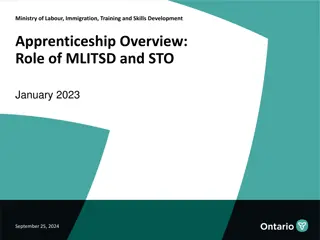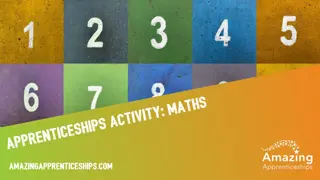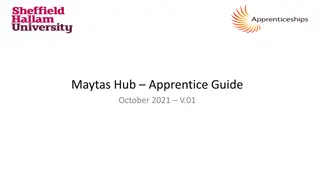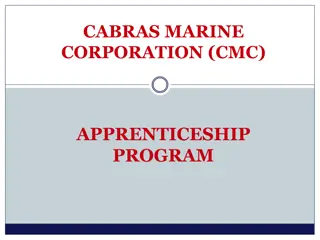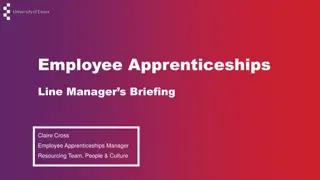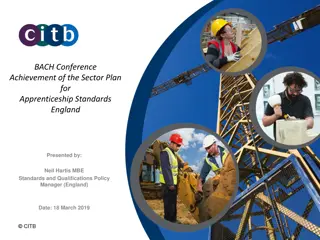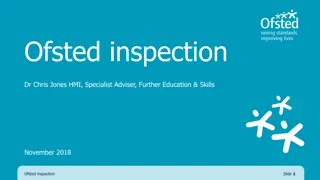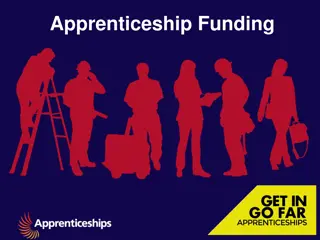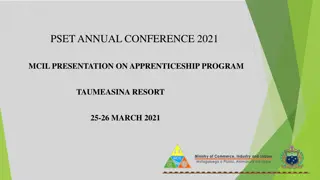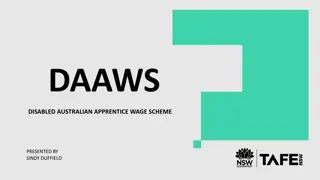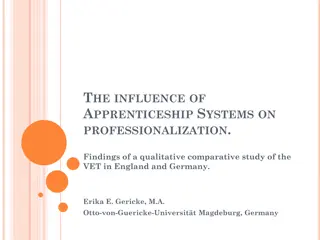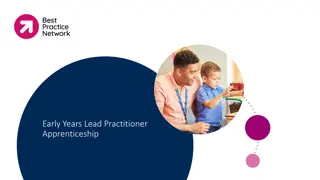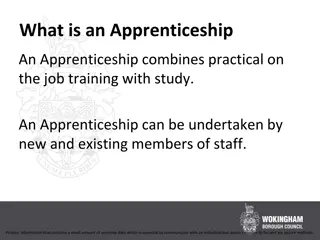What is an Apprenticeship and How will I Study as an Apprentice?
An apprenticeship is a real job where you gain hands-on experience, a salary, and qualifications while working. You'll spend at least 20% of your time on off-the-job training, treated like any other employee with real responsibilities. Discover different ways off-the-job training can be delivered and learn how you can apply for both apprenticeships and full-time university.
Download Presentation

Please find below an Image/Link to download the presentation.
The content on the website is provided AS IS for your information and personal use only. It may not be sold, licensed, or shared on other websites without obtaining consent from the author. Download presentation by click this link. If you encounter any issues during the download, it is possible that the publisher has removed the file from their server.
E N D
Presentation Transcript
WHAT IS AN APPRENTICESHIP? WHAT IS AN APPRENTICESHIP?
What is an Apprenticeship How you will study What you will study What sort of Apprenticeships available How different levels of Apprenticeships work and which ones you should apply for Entry requirements
What is an apprenticeship? An apprenticeship is a real job, with hands-on experience, a salary and the chance to train and gain qualifications while you work. You are treated just like all other employees, with a contract of employment, a salary and holiday leave. You are given real responsibilities. You will spend at least 20% (equivalent to 1 day a week) of your time completing off-the-job training, often at a college, university or with an independent training provider. You will train to be fully competent in your chosen occupation.
How will I study as an apprentice? What is an apprenticeship? In apprenticeships, this is called off-the-job training and should equate to 20% of your time. An apprenticeship is a real job, with hands-on experience, a salary and the chance to train and gain qualifications while you work. Your off-the-job training will be completed within your paid hours and will fit around the job commitment and needs of the business. You are treated just like all other employees, with a contract of employment, a salary and holiday leave. There are different ways that off-the-job training can be delivered. It could include: Once a week (day release) In blocks of a week or more at scheduled times (e.g. a week in September) Studying online A combination of the above You are given real responsibilities. You will spend at least 20% (equivalent to 1 day a week) of your time completing off-the-job training, often at a college, university or with an independent training provider. Your employer will select the apprenticeship training provider that will support you with your programme. You will train to be fully competent in your chosen occupation. Q. Can I apply for apprenticeships and also apply for full-time university at the same time to keep my options open? A. Yes. Apprenticeship opportunities are advertised all year round and many employers will advertise up to one year in advance of when they need their apprentice to start.
How will I study as an apprentice? What is an apprenticeship? In apprenticeships, this is called off-the-job training and should equate to 20% of your time. An apprenticeship is a real job, with hands-on experience, a salary and the chance to train and gain qualifications while you work. Your off-the-job training will be completed within your paid hours and will fit around the job commitment and needs of the business. You are treated just like all other employees, with a contract of employment, a salary and holiday leave. There are different ways that off-the-job training can be delivered. It could include: Once a week (day release) In blocks of a week or more at scheduled times (e.g. a week in September) Studying online A combination of the above You are given real responsibilities. You will spend at least 20% (equivalent to 1 day a week) of your time completing off-the-job training, often at a college, university or with an independent training provider. Your employer will select the apprenticeship training provider that will support you with your programme. You will train to be fully competent in your chosen occupation. Q. Can I apply for apprenticeships and also apply for full-time university at the same time to keep my options open? A. Yes. Apprenticeship opportunities are advertised all year round and many employers will advertise up to one year in advance of when they need their apprentice to start.
What will I study? Every apprenticeship will have a Standard, which outlines what the apprentice will learn and how their skills and knowledge will be assessed. The Standard is a short document (two or three pages) that has been created by different employers and industry experts. It sets out the Knowledge, Skills and behaviors that they have agreed the apprentice will need to demonstrate to be assessed as competent to perform that role at the appropriate level. It will also set out the qualifications that you will achieve as part of your apprenticeship and will explain how the assessment process will work. As well as the formal off-the-job learning, it is important to remember that you will also be gaining new skills every day as an apprentice, learning from the people that you work with who will help you to understand your role and the industry that you work in. You are constantly learning through an apprenticeship and will be applying your new knowledge and skills immediately in the job.
Which apprenticeships are available? There are thousands of apprenticeships in different job roles and industries. Each apprenticeship will also have a level attached to it. The four levels of apprenticeship can be found in the attached table How do the levels work and which one should I do? It will depend on the job role and your prior qualifications and experience as to which level you will need to start at. Try to keep your options open and explore everything. If you see a job title that you haven t heard of before, being advertised at a different level to the one you had in mind, don t dismiss it - have a quick read. You may be surprised at the range of opportunities that are available covering different levels and durations Q. If I have completed A-Levels, should I just look at degree apprenticeships? A. No, you should look at ALL levels of apprenticeship. For example, some employers will need you to complete an advanced apprenticeship first.
Who can do an apprenticeship? Anybody can do an apprenticeship, as long as you are 16 or over, living in England and not in full-time education. How long does an apprenticeship take? It usually takes between 1 and 4 years to complete an apprenticeship, depending on which level you do. As a minimum, an apprenticeship must last for 12 months. How will I be assessed? All apprentices go through a process called End Point Assessment (EPA), which is taken at the end of the apprenticeship. Some apprenticeships, especially those at higher or degree level can last for between four to six years. This is because apprentices are balancing studying and working full-time at the same time, so it can take a bit longer to complete than the traditional route. It is different for each apprenticeship, but could include a presentation, an interview, a practical observation, an online assessment or a different method. Who is the training provider? The training provider provides the off-the-job training, but they also have a key role in assessing your progress towards achieving your apprenticeship and ensuring that you feel supported. The EPA will test both your academic learning and occupational competence, which essentially means they will be looking for you to provide evidence and examples that demonstrate that you know how to perform your job. There are lots of different organisations that are registered as training providers and could include: - Independent Training Providers - FE Colleges - universities - Employer providers. Your training provider will be a crucial link between you and your employer. They will help you to complete your programme and will also be able to support you if you have any concerns or worries.
What will I be paid? Entry requirements Those aged 16 19 in the first year of their apprenticeship receive at least the minimum apprenticeship wage of 3.50 per hour. Some employers pay significantly more than this rate, and there are examples of both higher and degree apprenticeship adverts offering salaries of between 16,000 and 24,000 per year. Each apprenticeship vacancy will specify the entry requirements and skills or qualities the employer is looking for. Entry requirements can vary between different employers. Some employers might ask for GCSEs, others will ask for A Levels and some will ask for no qualifications at all. Many employers advertise roles with a competitive salary . This could mean the salary and benefits will be in line with similar roles for other organisations, or that it depends on your current skills and experience. It s important that you confirm the salary with the employer. As well as entry requirements, employers will be looking for how you will fit in with the organisation and for your passion and interest in working in that job role. It is important to pay close attention to each employer s advice and guidance on applying for them, so that you can really stand out in the application process and ensure you meet their requirements. Other financial benefits: Alongside the salary, some employers offer other benefits including a pension, access to a car, leisure facilities, or a relocation allowance if you have to move. your employer and the government will meet the tuition fees of your apprenticeship (including degree apprenticeships). As an employee, you will be paid a salary by your employer. This means graduate apprentices can be debt-free.
Pros and cons of Apprenticeships Pros Apprenticeships offer a direct alternative to full-time higher education for those who would prefer to start employment. Cons It can be difficult to balance academic study with work commitments you need to be well organised! Although you will study a higher education qualification, your experience of student life will be limited compared to those attending full-time courses at university or college. You can earn a wage while completing a higher education qualification, and you won't have to pay tuition or course fees. You will gain real knowledge, skills, and experience required for specific careers, and possibly professional accreditation. Your investment in high level training and study can provide a long term career path and increase your earning potential. You need to have a clear idea of the type of career you wish to pursue, as this is a vocational qualification. There is the possibility you may have to pay back your course fees if you decide to leave your apprenticeship early. The initial apprenticeship wage you start on may be quite low compared to other employment, and you'll need to cover your day-to-day living costs, rent, travel costs, equipment, and materials. Tax and National Insurance contributions will come out of your salary Your work experience, transferable skills, and high level qualifications may leave you well placed to obtain employment in a number of related careers.
USEFUL LINKS TO FURTHER RESEARCH USEFUL LINKS TO FURTHER RESEARCH APPRENTICESHIPS APPRENTICESHIPS An apprentices experience at BT Ask Apprenticeship guide The Gov s A-Z list of what apprenticeships are available UCAS Apprenticeship guide
Relevant to Undergraduate 16-18 Choices Apprenticeships are ideal if you have a clear idea of the career you d like to pursue, and you re willing to commit to work and study. Unlike in school, at college or on a traditional degree course, the majority of your learning will be through on-the-job training in your place of work. To be considered for an apprenticeship programme in England , you need to be: aged 16 or over living in England not in full-time education Apprenticeships would suit someone who: has a clear idea of the type of career they wish to pursue is willing to commit to work and study, but would prefer a more practical and work-related approach to learning is ready to start work with an employer, and be based in the workplace most of the time is well organised and able to cope with the competing demands of work and academic study at the same time is ready to be assessed through a mix of assignments and written work, including essays, reports, practical exercises, end tests, and exams




